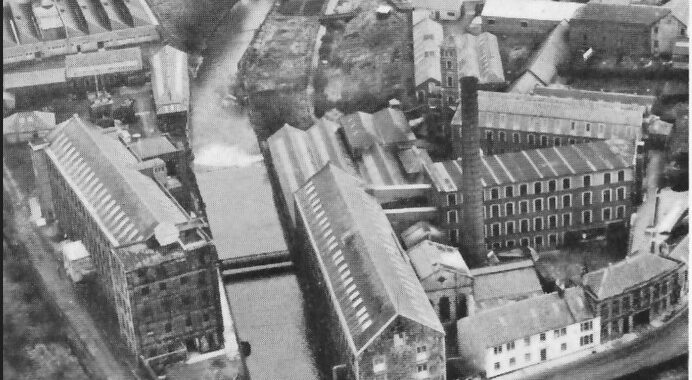The Linen Thread Company was founded in 1898. It was an amalgamation of like-minded, successful linen thread manufacturers with mills in Scotland, Northern Ireland and USA. Finlayson, Bousfield & Co. was a founding member, and William, Archibald and James Finlayson (the three sons of James Finlayson, who established Finlayson Bousfield in 1844) were appointed to its first Board of Directors. The other founding members were the Finlaysons’ Flax Spinning Mill in North Grafton, Massachusetts; W. J. Knox Ltd. of Kilbirnie, Ayrshire; Wm. Barbour & Sons Ltd., Hilden Mill, Lisburn; Barbour Flax Spinning Co., Patterson, New Jersey; Barbour Brothers of New York and Marshall Thread Co. of Newark, New Jersey. They were soon joined by seven other flax companies from Britain, Ireland and USA., including Crawford Brothers of Beith, Ayrshire.
The Linen Thread Company grew and expanded into a huge international concern, with mills in Europe, Australia and South America. Its Board of Directors insisted on the use of high quality flax, opened scientific laboratories to ensure quality and innovation, and established a very productive and unrivalled world-wide sales organization through local agents. Throughout its existence, successive members of the Finlayson family from Johnstone, the Knox family from Kilbirnie and the Barbour family from Lisburn (the Barbours were descendants of the Kilbarchan Barbour linen merchants) were on the Board of Directors. The dedication and entrepreneurial skills of the directors ensured the success of the company, and was of significant advantage to the financial success of each independent member company. The UK head office was in Glasgow.
To manufacture quality thread, it was deemed essential to start with quality raw flax plants. In Finlayson Bousfield’s Johnstone mills quality raw flax was purchased from the Courtrai district in Belgium or from Ireland. It is likely that the ponds on the north bank of the Black Cart (shown on OS Maps, Renfrewshire XI.8, 2nd ed., 1897 and later) were used as the retting ponds, although in some other of the Linen Thread Co’s flax mills, the soaking of raw flax was undertaken indoors. The flax was then taken to the drying room before the next processing stages of heckling and scutching, were undertaken by machine indoors. The processed flax was then ready to be sent to the spinning mill. The Finlayson Mill in North Grafton, USA, operated only as a spinning mill of already processed flax.
In Johnstone, Finlayson Bousfield manufactured a wide variety of quality threads and cords, including hand and sewing machine threads, saddler’s threads, bookbinder’s threads, carpet thread, crochet thread, flourishing thread (for embroidery), glove thread, lace thread, and shoe thread. Samples of their finished products can be viewed locally in Johnstone Museum.
But all was not always plain sailing. In February 1902 at one o’clock on a Wednesday morning, a dramatic fire broke out in the company’s Napier Street Mill, which contained a large stock of finished thread ready for the market. At one end of the 200 feet long building, the fire burnt through the floor of the second storey and machinery fell into the burning mass below. Luckily, manufacturing was unaffected as the building was primarily used for storage and, due to a prudent insurance, the building could be repaired.
Despite this setback, Finlayson Bousfield continued to flourish for another 50 years. William’s son, Charles Kay Finlayson joined the company in the early 1900s and played an active part. His sons, too, later joined the company. William was Head Sales Director and Charles was Head Manufacturing Director of the Linen Thread Co. in the 1950s.
Although flax was the strongest natural fibre in the world, linen production declined in the 1950s when man-made fibres were introduced to the market. Both Finlayson Bousfield and The Linen Thread company ceased trading in the next decade and the main Johnstone flax mill site was later demolished.
Finlayson Bousfield’s main Flax Mill site in Johnstone
© 2022, Helen Calcluth, Renfrewshire Local History Forum


